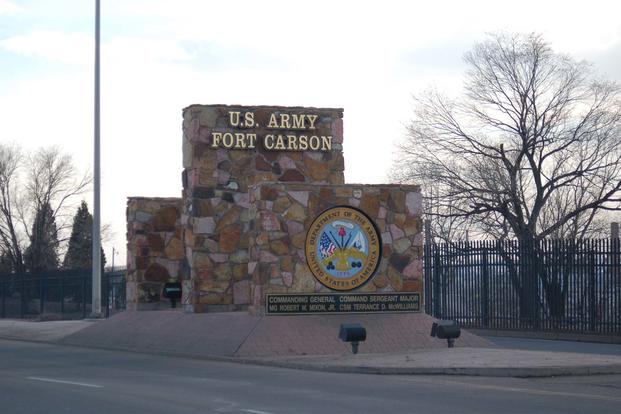Jose Barco, a decorated U.S. Army veteran once based out of Fort Carson who served two tours in Iraq during some of the most intense fighting but later served time for a felony conviction, has become a casualty of a different kind of war.
At an immigration hearing Wednesday morning, he told Assistant Immigration Judge Matthew Kaufman that he was not interested in appealing his deportation case after an immigration attorney gave him a 2% chance of winning a case, which could take several more years and and thousands of dollars to fight.
"I'm disillusioned and tired. Send me to a country that will accept me since my country doesn't," he told his brother, Ray in a phone call late Wednesday.
Barco, after serving 15 years in prison for a felony conviction, was taken into custody last month by U.S. Immigration Customs Enforcement officers because his citizenship papers, which were supposed to be processed while he was in the Army, were lost.
His decision came as a surprise, as there appeared to be some hope that he could win his case. The Resident Alien Identification, with his five-year-old profile, was unearthed and members of Congress were working to untangle lost documentation written back when the Army used hard copies for citizenship processing.
“Are you sure?” Kaufman, the judge, asked him. Barco lifted his head and confirmed that he was not afraid to go to Venezuela.
Fresh off of serving prison time, veteran Fort Carson soldier hopes for immigration reprieve
As agents from multiple federal agencies conducted immigration raids in Denver and Aurora on Wednesday morning, a decorated soldier sat in a holding cell in the Aurora ICE Detention Center praying for a miracle.
With that, the 39-year-old with burns on his arms from a war injury, gave his beloved platoon medic a fist bump goodbye and was led out by courtroom guards.
“I think they just completely broke Barco’s spirit and he just had no more left in him from behind bars,” said Ryan “Doc” Krebbs, a member of the infamous 2nd Battalion, 12th Infantry, a group of 500 soldiers that became the subject of a documentary detailing the trauma of the war on returning soldiers.
One of those soldiers was Barco.
The battalion accounted for half of Fort Carson’s combat losses.
Jose Barco-Chirino is the son of a Cuban political prisoner who protested against Communism. He was born when the family fled to Venezuela and granted asylum in America at the age of 5.
The promise of U.S. citizenship from the Army sounded better than working construction in Miami, so he joined up before he was old enough to drive.
Between tours he filled out citizenship papers, but they disappeared.
He tried again after his second tour, but he never finished them possibly because the 22-year-old was, as he described it, “a mess.”
Upon his return to Fort Carson, with Post Traumatic Stress Syndrome, Traumatic Brain Injury, and reliant on half a dozen medications and drinking, he had a flashback one night, shot into a crowd and injured a pregnant woman in the leg.
Convicted and sentenced to 52 years, he was given early parole and released just days after President Donald Trump was sworn in Jan. 20. A team of ICE agents were waiting for him with an open seat in their vehicle to take him to another cell, this time to await his fate.
Krebbs and around two dozen of Barco’s brothers-in-arms have been fighting to find a loophole with every minute and military pull they had. Dixon Ramirez, who served with Barco in Baghdad’s al Dora neighborhood around 2007 during the Surge, was ready to give $20,000 from the sale of his home to pay the veteran immigration attorney's legal fees.
They’ve met with politicians, written emergency memos to the Department of the Army and texted every development to keep their friend in the only home he’s ever known.
Wednesday morning’s text to a Denver Gazette reporter from Krebbs upon leaving immigration court fell flat and hopeless.
“He gave up. Being deported to Venezuela.”
A text chain brought the news to a stunned band of brothers.
“What did the judge say?," asked one person.
Doc answered: “Hands tied. Said he could buy time with appeals. Barco waived right to appeal.”
“What was reason?” asked another.
Responded Krebbs: “Ineligible to be US citizen ever because of violent felony.”
"Jeez" wrote one. "F" wrote another. As the shock wore off, the responses became more empathetic. "I understand man. He just wants out."
An ICE spokesperson confirmed that Barco was in the facility as of Wednesday afternoon. It's unclear when he'll be sent to Venezuela, but earlier this week, Barco watched his roommate got rounded up at 3 a.m. with dozens of other men, and placed in a van for El Paso.
Other inmates have told Barco it takes 30 to 60 days before deportation happens.
He just wants out of the ICE facility, where, he said, he's considered a target as an American among hardened criminals who fight over little things, like who's first at the microwave.
The choice he made before the judge on Wednesday may have seemed like he gave up, but it was the first time in 15 years he's made a decision of his own, he said.
He told Ray, "I'm not going to grovel my country for the privilege of living in it, a privilege I thought I earned in blood."
© 2025 The Gazette (Colorado Springs, Colo.). Visit www.gazette.com. Distributed by Tribune Content Agency, LLC.












